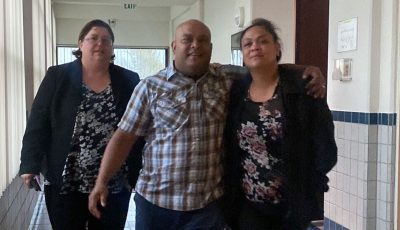Swift guilty verdict for Mirano
Jury reaches verdict after less than an hour

After deliberating for less than an hour, the 12 jurors unanimously reached a verdict finding Mirano guilty of conspiracy to commit bank fraud and bank fraud.
Mirano calmly stood beside his court-appointed counsel, Vicente Salas, when U.S. District Court courtroom deputy Tina Matsunaga read the verdict at 4:35pm.
The jurors began their deliberation at 3:25pm. They sent a note to the court at 4:03pm, informing the judge that they had reached a verdict.
The trial began on July 2.
Mirano will be sentenced on Oct. 19, 2012 at 9am. He will remain in detention until his sentencing.
Salas refused to comment on the verdict. U.S. attorney Stephen Leon Guerrero said that their public information office in Guam will issue a statement.
Chief Judge Ramona V. Manglona presided over the case.
When asked by Saipan Tribune how they reached the speedy verdict, the jury’s foreperson replied, “It’s an easy case” as all the evidence were laid out well.
On Tuesday, Manglona acquitted Mirano’s co-defendant, Mohammad Jahangir Miah, for lack of corroborating evidence. He was represented by court-appointed counsel Colin Thompson and co-counsel Janet King.
In his closing arguments yesterday, Leon Guerrero said that Mirano did not have the Federal Bureau of Investigation’s blessing when he committed his criminal conduct.
“The FBI does not condone criminal behavior,” Leon Guerrero stressed, adding that FBI special agent Haejun Park did not give Mirano authorization to cash those checks.
Four cashiers testified about Mirano cashing the checks.
“The physical evidence never lies,” he said. “Whose name was on the checks? Who cashed the checks? Who benefited from the checks? Was there any authorization to cash the checks? Who admitted cashing the checks?”
In his closing arguments, Salas said that Mirano did not act with criminal intent because he believed he was helping the FBI investigate the scam.
“He [Mirano] risked his life not once but three times,” said Salas, referring to the FBI’s installation of audio and video surveillance devices on Mirano to record the alleged transactions between Mirano and Miah.
The defense lawyer said that as early as November 2011, Mirano has been communicating with FBI special agent Park through emails and phone calls.
Salas said that Mirano was working with Park and two other FBI special agents in this tax refund scam.
Salas said that Mirano was cashing the checks given to him by the source (Miah) because he was building a case for the FBI.
Salas said that a day after Mirano emailed Park that he had information and that it’s big, Mirano cashed two checks to gain confidence with the “source.”
Salas said that Mirano sent another email to Park on Jan. 26, 2012, but the agent did not reply.
The defense lawyer said four more checks were cashed between Jan. 28 and Feb. 1, 2012.
Salas said the amount of the four checks were bigger than the previous two checks because Mirano had already gained the confidence of the “source.”
Salas said that Mirano in fact gave his identification through his passport to the cashiers and even provided his contact number.
Salas pointed out that the total amount of checks involved is only over $2,000 and Mirano got only 10 percent or $250 and that it’s not even cash but grocery items.
Salas said his client only followed the script and the plan to build the case for the FBI.
“This case is not about greed. It’s more about the power of the FBI,” he said.
Salas said the FBI investigation failed as the targeted person was not caught.
According to the FBI, during the March 19, 2012, meeting, Miah frisked Mirano for possible recording equipment and found the recording wires hidden underneath his shirt.
When Mirano sent a text to agent Park that Miah had found the wires, Park instructed Mirano to leave Miah’s house immediately.
Park stated that he and another special agent proceeded to Miah’s residence out of fear of possible destruction of evidence related to the criminal activity in question.
By Ferdie de la Torre
Reporter



























